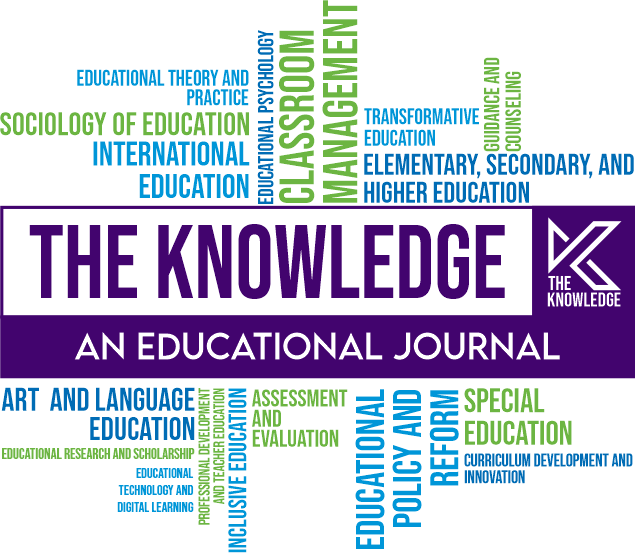Integrating TBLT with Digital Tools: Impacts on Learners’ Oral Performance
DOI:
https://doi.org/10.55737/tk/2k25c.43077Keywords:
Digital Tools, EFL Learners, Oral Performance, Task-based Language Teaching, Technology-Mediated LearningAbstract
Speaking proficiency is one of the most vital yet challenging skills for second language learners to master. Traditional methods often fall short in creating meaningful opportunities for authentic communication, which has led to growing interest in Task-Based Language Teaching (TBLT) as a way to foster oral performance. With the rise of digital technologies, TBLT can now be enriched through platforms such as Zoom, WhatsApp, Duolingo, and AI-powered applications. It offers learners more interactive and flexible practice. This study explores how integrating TBLT with digital tools influences English as a Foreign Language (EFL) learners’ speaking skills. Using a mixed-methods design, 60 intermediate learners engaged in digitally mediated tasks over eight weeks. Data were collected through pre-speaking tests and post-speaking tests, recordings, surveys, and semi-structured interviews. The results showed significant improvements in fluency, accuracy, and complexity, with fluency demonstrating the strongest gains. Learners also reported greater motivation, engagement, and confidence, alongside positive perceptions of digital TBLT. The findings suggest that blending TBLT with digital tools creates an effective, learner-centered approach to enhancing speaking skills in EFL contexts. The study further offers practical recommendations for teachers, curriculum designers, and policymakers to integrate digital resources into communicative task design.
References
Abdelhalim, S. M., & Alsehibany, R. A. (2025). Integrating AI-powered tools in EFL pronunciation instruction: effects on accuracy and L2 motivation. Computer Assisted Language Learning, 1–25. https://doi.org/10.1080/09588221.2025.2534015
Aljohani, N. J. (2025). Technology-mediated task-based language teaching: a CALL evaluation framework and its pedagogical implications. Computer Assisted Language Learning, 38(3), 638–667. https://doi.org/10.1080/09588221.2024.2317840
Azizifard, F. M. (2024). The effect of task-based language teaching on speaking skill. Cihan University-Erbil Journal of Humanities and Social Sciences, 8(1), 65–71. https://doi.org/10.24086/cuejhss.v8n1y2024.pp65-71
Bava Harji, M., & Gheitanchian, M. (2017). Effects of multimedia task-based teaching and learning approach on EFL learners’ accuracy, fluency and complexity of oral production. Turkish Online Journal of Educational Technology (TOJET), 16(2), 25–34.
Bhandari, L. P., Dahal, N., Awasthi, J. R., & Dhungana, S. (2025). Technology-mediated task-based language teaching: A systematic review. Cogent Education, 12(1), 2560051. https://doi.org/10.1080/2331186X.2025.2560051
Bryfonski, L., & McKay, T. H. (2019). TBLT implementation and evaluation: A meta-analysis. Language Teaching Research, 23(5), 603–632. https://doi.org/10.1177/1362168817744389
Chen, C.-M., Tan, C.-C., & Lo, B.-J. (2016). Facilitating English-language learners’ oral reading fluency with digital pen technology. Interactive Learning Environments, 24(1), 96–118. https://doi.org/10.1080/10494820.2013.817442
Díaz, D. G., Parra, J. A., Leyva, N. L., Herrera, E. M., & Zambrano, L. D. (2023). The impact of task-based language teaching on English as a EFL learners’ speaking proficiency and motivation. Ciencia Latina Revista Científica Multidisciplinar, 7(3), 3796–3810. https://doi.org/10.37811/cl_rcm.v7i3.6443
Fang, W. C., Yeh, H. C., Luo, B. R., & Chen, N. S. (2021). Effects of mobile-supported task-based language teaching on EFL students’ linguistic achievement and conversational interaction. ReCALL, 33(1), 71–87. https://doi.org/10.1017/S0958344020000208
Faraz, H., Shehzad, W., & Saleem, M. (2024). Assessing intercultural competence in Pakistani students: An analysis of O-Level English language examination. Qlantic Journal of Social Sciences, 5(2), 57–65. https://doi.org/10.55737/qjss.619679389
González‐Lloret, M. (2017). Technology for task‐based language teaching. In C. A. Chapelle & S. Sauro (Eds.), The handbook of technology and second language teaching and learning (pp. 234–247). Wiley-Blackwell.
Milon, M. R. K., Ishtiaq, M., Ali, T. M., & Imam, M. S. (2023). Unlocking Fluency: Task-Based Language Teaching (TBLT) in Tertiary Speaking Classes-Insights from Bangladeshi Teachers and Students. ICRRD Quality Index Research Journal, 4(4). http://dx.doi.org/10.53272/icrrd.v4i4.11
Saleem, M., & Khan, J. (2024). TESOL in transition: Local challenges and global influences. Wah Academia Journal of Social Sciences, 3(2), 950–968. https://doi.org/10.63954/wajss.3.2.52.2024
Saleem, M., Batool, M., & Ijaz, S. (2025). Practicing language policy in English language teaching institutions. The Critical Review of Social Sciences Studies, 3(2), 2549–2551. https://doi.org/10.59075/58amh696
Tamayo, P. (2024). The effect of task-based learning on eighth graders’ speaking skills through ICT tools (Doctoral dissertation, Facultad de Artes y Humanidades).
Tavakoli, H., Lotfi, A. R., Biria, R., & Wang, S. (2019). Effects of CALL-mediated TBLT on motivation for L2 reading. Cogent Education, 6(1), 1580916. https://doi.org/10.1080/2331186x.2019.1580916
Vygotsky, L. S. (1962). Language and thought (pp. 11193-000). Cambridge, MA: MIT Press.
Vygotsky, L. S. (1978). Mind in society: The development of higher psychological processes (Vol. 86). Harvard university press.
Xue, S. (2022). A conceptual model for integrating affordances of mobile technologies into task-based language teaching. Interactive Learning Environments, 30(6), 1131–1144. https://doi.org/10.1080/10494820.2019.1711132
Zhang, D. (2025). Task-based teaching method in English teaching from the perspective of big data. International journal of web-based learning and teaching technologies, 20(1), 1–17. https://doi.org/10.4018/ijwltt.381309




